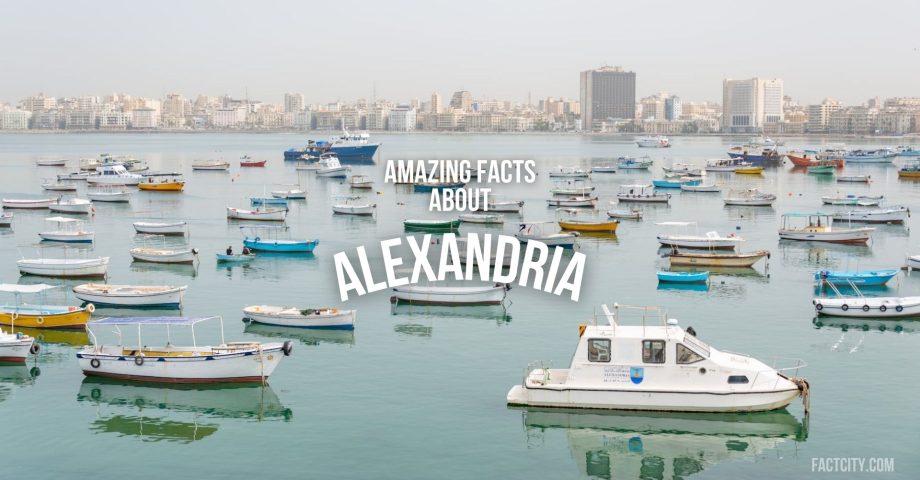Alexandria is one of the largest and most popular cities in Egypt – meaning it welcomes more than its fair share of tourists each and every year! Egypt is certainly a hotspot for British visitors, too – and beyond Cairo and the Nile, Alexandria proves to be an enchanting trip abroad for UK holidaymakers.
But what is it about Alexandria that makes it so popular with visitors not only from Britain, but from all over the world? How big is the city – and what are some of its best-loved attractions, landmarks, and hotspots?
If you’re planning a holiday to Egypt any time soon and fancy taking a look out at the city of Alexandria, keep reading for a complete lowdown on what to expect. Here are some fun facts about Alexandria to gear you up for that next big adventure.
1. Alexandria is officially the biggest city on the Mediterranean coast.
If you’re interested in touring the Mediterranean, you might be intrigued to know that Alexandria is actually the biggest metropolis of its kind along the coast – even though it’s still the second-biggest city in Egypt, with the truly enormous Cairo claiming the top spot.
Alexandria is home to more than 5.6 million people, and measures around 15.75 square miles, or 40 square km. Compare that to Edinburgh – which has a population of half a million people, and measures 102 square miles (264 square km)! As you can imagine, Alexandria is a pretty dense city!
2. The city is named after its famous founder.
Alexandria is named after a true historical legend – Alexander the Great! He was the conquesting leader of Corinth and Macedon, and he first established this Egyptian city when building upon the initial village of Rhacotis. The city’s been around for more than 2,300 years – it’s truly old!
In fact, let’s compare it again with one of our own British cities – London, believe it or not, is slightly younger than Alexandria. By slightly, I mean over three centuries – it’s just short of two millennia old!
3. Alexandria is famous for being the home of multiple important Egyptian landmarks.
While many people will head to Cairo to drink in many of Egypt’s famous landmarks and sights, Alexandria plays host to at least three of the most notable tourist sites in the country. For example, you can always plan visits around the Citadel of Qaitbay and the Alexandria Library!
There’s also Montaza Palace, the Alexandria Zoo, and the Catacombs of Kom el Shoqafa. And, millions of people visit these hotspots every single year. The Alexandria Library alone, for example, usually welcomes more than 1.4 million visitors annually! That’s about the same number of people who visit the British Library in London, too.
4. Queen Cleopatra was born in Alexandria.
Alexandria is said to have been the birthplace of one of history’s greatest leaders and certainly one of the most important Egyptian icons – the legendary Queen Cleopatra VII, who many of us are probably aware of thanks to history class!
In fact, many refer to it as the City of Cleopatra – but, regrettably, it eventually became a battleground as civil war broke out under the queen and Julius Caesar.
5. Alexandria was once home to one of the original Seven Wonders of the World.
While it’s an ancient wonder now, the Lighthouse of Alexandria played a pivotal role as part of the original Seven Wonders! The city played host to a sailing beacon otherwise known as the Pharos – and it likely helped to influence the design of modern lighthouses.
This really was an impressive structure, though sadly, none of us got to see it in person. It’s thought to have stood more than 330 feet or 100 m tall, which, apparently, made it one of the tallest artificial structures on the planet, dwarfed only by the equally impressive Giza pyramids. The ancient Egyptians really liked to go large!
6. There’s a huge necropolis in the heart of the city.
Believe it or not, archaeologists only discovered the enormous Gabbari necropolis in 1997! This huge burial ground is said to date back more than 2,000 years – and those investigating it have even found ancient graffiti left behind by people robbing the graves for riches!
Several important antiques were also unearthed during the exploration of the site, and archaeologists even uncovered messages given to loved ones who had passed away. Beyond the grisliness of skeletons and remains, the necropolis also brought forth ceramics and other decorations – a truly fascinating find, especially given the fact that explorers came across it completely by accident!
7. Alexandria has one of the world’s oldest tram systems on record.
At the very least, the Alexandria tram system is likely the oldest of its kind in Africa, with the transport service starting up all the way back in the 1860s! Of course, electric trams didn’t become a thing until the turn of the 20th century, but before that time, people used horse-drawn and steam trains to get around the city.
Interestingly, it’s a fairly unique system in that it hosts double-decker cars – it actually shares this distinction with the tram cars you’ll find over in dear old Blackpool, on the Lancashire coast!
Speaking of the UK and trams – Britain’s oldest tram network is only a few decades older than Alexandria’s. The distinction belongs to the Swansea and Mumbles Railway, over in Wales, which was opened to the public in 1807. It’s actually the oldest passenger tram system in the world.
8. Alexandria actually became a village for centuries.
Alexandria has always been important in the history of Egyptian societal growth, but bizarrely, the area went into decline for centuries. Around the 7th century, the city devolved back into a fishing village – lining up with Napoleon’s claims when he eventually arrived on the city’s shores. However, the city was revived in the 1800s.
Few cities around the world have the distinction of downsizing and then returning to glory – and in the UK, one of the most notable cases was the town of Downton, which became a village for a while thanks to the Great Reform Act. The area has since become a market town again, just as Alexandria has become a thriving city once more. Another interesting parallel between Egypt and the UK!
9. There’s not much left of ancient Alexandria.
While the city is certainly ripe for historical sights and retains much of its architectural wonder, Alexandria is far from preserved. In fact, much of the ancient streets, buildings, and landmarks here fell prey to invading forces and earthquakes – meaning it sadly didn’t stand much of a chance of survival.
In fact, Alexandria has done an amazing job rebuilding itself as a spectacular city with modern structures and sights that should – hopefully – weather more centuries to come. Interestingly, many of the raw supplies left over from earthquakes that rocked the city were actually used by the Ottomans – with the remains of the legendary lighthouse reportedly having been put towards the Qait Bey Citadel.
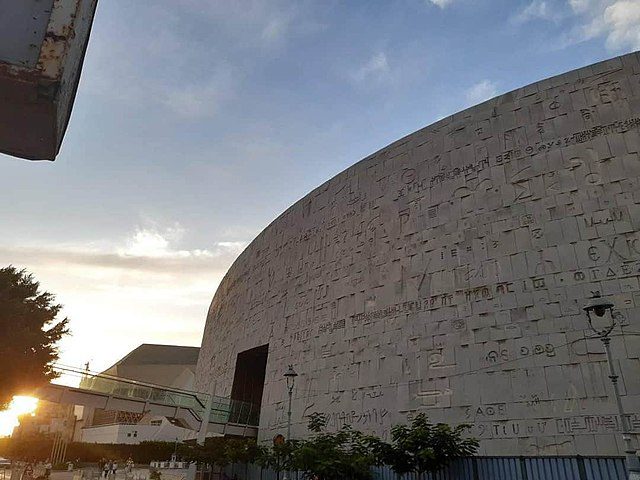
10. Alexandria uses the Egyptian Pound.
When visiting Alexandria, keep in mind that you’ll need to exchange your currency – and here, local people use the Egyptian Pound.
It’s also a good idea to plan ahead for shifting exchange rates between the British and Egyptian Pounds before you choose to travel. Always consult an exchange bureau – or your bank – for the latest rates, simply because they’re likely to fluctuate so much!
At the time of writing, £1 is worth around 67 Egyptian pounds – and this is at an all time high. While the Egyptian Pound remained at a stable exchange with GBP at around 20-25 for every £1 between 2021 and 2023, rates skyrocketed in 2024, and have been rising ever since.
That said, again, rates do fluctuate – so keep an eye out for market changes before you visit Alexandria.
11. There are a few ways to get to Alexandria from the UK.
Speaking of visiting Alexandria, it’s always a good idea to plan your journeys to Egypt ahead of time. Thankfully, as a bit of a hotspot (literally) for British holidaymakers, there are plenty of speedy and reliable ways to get here.
Naturally, you’re going to need to board a plane – and according to Skyscanner, there are plenty of frequent flights out to the city through airlines such as Wizz Air, Pegasus, Air Arabia, and Ryanair. Your best shot at getting to Alexandria swiftly and smoothly is to travel via London, though do be prepared for there to be a short layover on route.
You’ll usually spend between eight or nine hours flying from the UK to Alexandria, so be prepared with snacks and entertainment before you touch down!
12. There are a few entry requirements to keep in mind.
When travelling from the UK to Alexandria, or indeed anywhere in Egypt, you’ll need to make sure you have a valid visa, and that you have a valid passport with at least six months left to expiry after the date you arrive.
To apply for a visa, you can either fill out details and pay online, or you can even visit the Egyptian Consulate General, or apply via post. If you prefer, you can also fill out details when you arrive in Egypt. That’s because several Egyptian airports have kiosks where you can complete visa applications with a one-off payment of $25. Just make sure you pay in cash, because cards aren’t accepted!
You can also extend your visa to stay in Alexandria in some cases – this is always worth doing if you know your visa is about to expire, because you could get fined if you leave it too late!
It’s a good idea to check the UK government’s entry requirements page before you travel – so you’re not caught on the hop when you should be enjoying yourself!
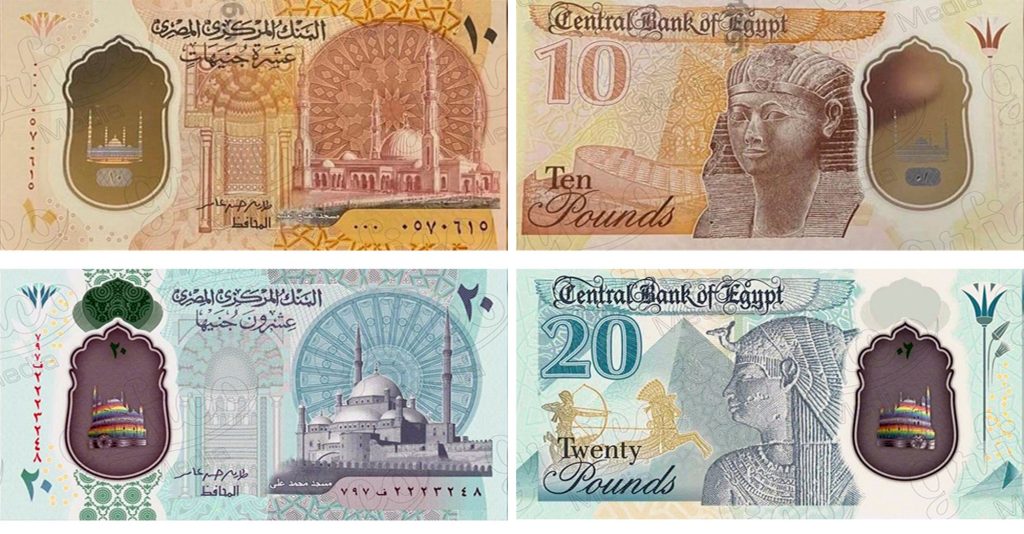
13. The UK government is currently warning against travel to Egypt.
While you may be gearing up to visit Alexandria (and who could blame you), the UK government advises against all but essential travel, in some cases, due to ongoing conflicts. These restrictions are in place to help protect travellers and holidaymakers who may innocently face harm as they explore the region.
Again, it’s always a good idea to check the UK government’s website before you travel to Alexandria, or indeed anywhere in Egypt. Remember, too, that no travel arrangements are considered completely safe – and that, where possible, you should always travel in groups for safety reasons.
Of course, it’s worth remembering that this travel advice may change in the years to come, so always keep up to speed with the latest safety warnings and recommendations before you book flights and accommodation. It’s better to be safe than sorry, as they say!
14. Hundreds of thousands of British people travel here.
Though there are no exact visitor figures from the UK for Alexandria, it’s still estimated that more than 260,000 British people travel to Egypt as a whole every single year, with this number having bounced back following restrictions at the height of the COVID-19 pandemic.
That’s only a drop in the ocean compared to how many people visit Egypt from all over the world, as you might imagine! It’s estimated that more than 14 million people travel here each year. There are no precise figures for visits to Alexandria itself, however, it’s thought that the region makes over £700 million from outside tourism every year.
15. It’s good to have a British contact while travelling in Alexandria.
And I don’t just mean friends and family back home! When travelling anywhere outside the UK, it’s wise to have the details for your national embassy in case you experience an emergency or are having difficulties getting back home.
The UK government advises that visitors to Alexandria should contact the British Consulate General, with a switchboard available through +202 2791 6000.
However, the local British embassy you’ll need to contact is based over in Cairo. It’s at 7 Ahmed Ragheb Street in Garden City, and can be contacted on the above number, or +44 20 7008 5000.
Full details on contacting British embassy support while in Egypt are available through the UK government’s website.
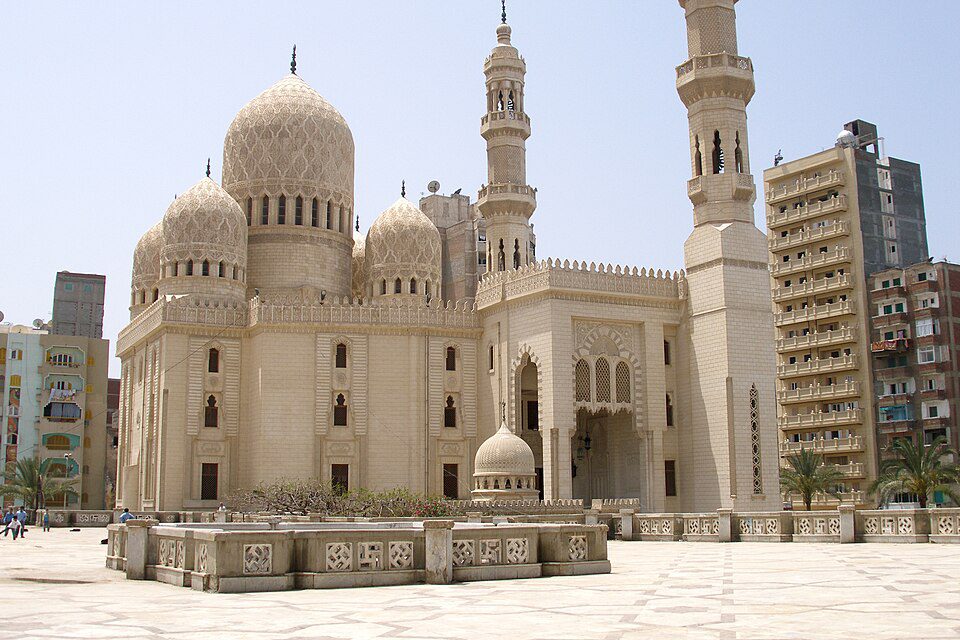
16. Alexandria was once a very important port for sea commerce.
Much of Alexandria’s success comes from its status as a major sea port for Egypt in general – and, in fact, as explored earlier, it was once a fishing village!
The city has been used as a naval operations base and a pivotal trade point for centuries. In fact, since the 1600s, it was still used as a midpoint for sea trade between the Mediterranean and the Red Sea.
It was after this, however, that the city fell due to disease and neglect – but thankfully, it regained its prominence thanks to its position in the cotton trade.
17. It’s warm out here – but maybe not as sweltering as you might think.
When we think of Egyptian cities, we probably think of boiling hot days and stunning sunshine – however, thanks to its closeness to the Mediterranean, Alexandria is actually quite a bit more temperate compared to other Egyptian regions.
For example, thanks to winds from across the sea, you’re likely to experience an average summer-height temperature of around 31 °C. That’s only around six degrees warmer than what we’d experience in Britain at its hottest (though we’re often likely to experience much cooler, wetter summers)!
And yet, believe it or not, Alexandria does get rain and hail, too! It’s estimated that the city experiences around 200 mm of rain every year, largely along the coastline. That said, compare the figure to Portsmouth, one of our biggest coastal cities – which gets almost 1,200 mm of rain a year – six times as much! Probably not much need for your wellies when you travel, then!
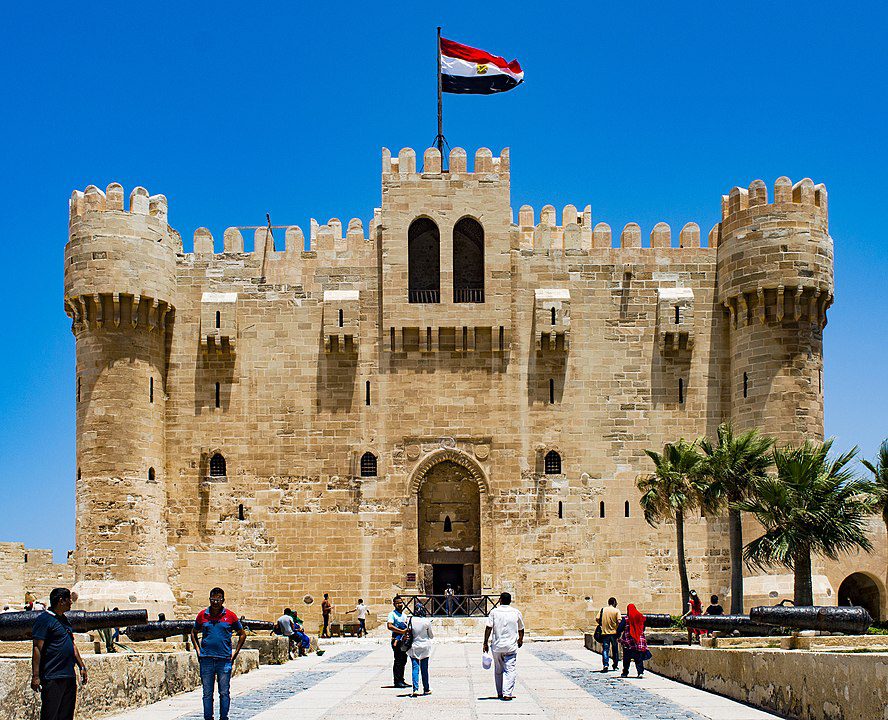
FAQs about Alexandria
What is Alexandria famous for?
The city of Alexandria is probably most famous for being the site of the Pharos, the ancient lighthouse that made up part of the Seven Wonders of the World. However, it’s also famous for its library, and its array of modern architecture that has been built up after much of the old city was destroyed.
Was Cleopatra’s palace in Alexandria?
It’s thought that Queen Cleopatra certainly had a palace in Alexandria, as archaeologists have found remnants along the seabed in the harbor. The Queen was also born here, and it’s where a civil war broke out under her reign (and against the backdrop of Julius Caesar’s Roman empire).
Is Alexandria safe to visit?
The tourist zones around Alexandria, Egypt are considered reasonably safe to visit, but all journeys abroad come with risks. It’s best to travel in groups, and to take the UK government;’s travel advice, as some areas of Egypt are advised against travelling to due to ongoing conflicts. Make sure to keep your possessions close by and to avoid walking around the city after dark if you’re not confident. Always keep details for the British embassy, too.
Further reading:
https://facts.uk/tag/Egypt
https://www.tripadvisor.co.uk/Tourism-g295398-Alexandria_Alexandria_Governorate-Vacations.html
https://www.divergenttravellers.com/things-to-do-in-alexandria-egypt/
Do you know any interesting facts about Alexandria? Share them in the comments below!
